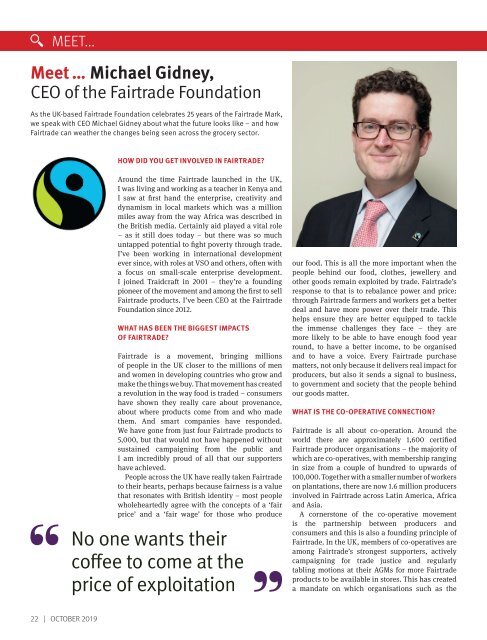Co-op News October 2019: Sustainable Development
The October 2019 edition of Co-op News looks at the UN's Sustainable Development Goals (SDGs) and how co-o-operatives can help make them happen – with interviews with Marc Noel, Vandana Shiva, Balu Iye, Maria Eugenia Perez Zea, Jurgen Schwettman and Patrick Develtere. We also speak with Michael Gidney, CEO of the Fairtrade Foundation about the impact of Brexit, and look at co-ops in the context of the UK's current politics.
The October 2019 edition of Co-op News looks at the UN's Sustainable Development Goals (SDGs) and how co-o-operatives can help make them happen – with interviews with Marc Noel, Vandana Shiva, Balu Iye, Maria Eugenia Perez Zea, Jurgen Schwettman and Patrick Develtere. We also speak with Michael Gidney, CEO of the Fairtrade Foundation about the impact of Brexit, and look at co-ops in the context of the UK's current politics.
Create successful ePaper yourself
Turn your PDF publications into a flip-book with our unique Google optimized e-Paper software.
MEET...<br />
Meet … Michael Gidney,<br />
CEO of the Fairtrade Foundation<br />
As the UK-based Fairtrade Foundation celebrates 25 years of the Fairtrade Mark,<br />
we speak with CEO Michael Gidney about what the future looks like – and how<br />
Fairtrade can weather the changes being seen across the grocery sector.<br />
HOW DID YOU GET INVOLVED IN FAIRTRADE?<br />
Around the time Fairtrade launched in the UK,<br />
I was living and working as a teacher in Kenya and<br />
I saw at first hand the enterprise, creativity and<br />
dynamism in local markets which was a million<br />
miles away from the way Africa was described in<br />
the British media. Certainly aid played a vital role<br />
– as it still does today – but there was so much<br />
untapped potential to fight poverty through trade.<br />
I’ve been working in international devel<strong>op</strong>ment<br />
ever since, with roles at VSO and others, often with<br />
a focus on small-scale enterprise devel<strong>op</strong>ment.<br />
I joined Traidcraft in 2001 – they’re a founding<br />
pioneer of the movement and among the first to sell<br />
Fairtrade products. I’ve been CEO at the Fairtrade<br />
Foundation since 2012.<br />
WHAT HAS BEEN THE BIGGEST IMPACTS<br />
OF FAIRTRADE?<br />
Fairtrade is a movement, bringing millions<br />
of pe<strong>op</strong>le in the UK closer to the millions of men<br />
and women in devel<strong>op</strong>ing countries who grow and<br />
make the things we buy. That movement has created<br />
a revolution in the way food is traded – consumers<br />
have shown they really care about provenance,<br />
about where products come from and who made<br />
them. And smart companies have responded.<br />
We have gone from just four Fairtrade products to<br />
5,000, but that would not have happened without<br />
sustained campaigning from the public and<br />
I am incredibly proud of all that our supporters<br />
have achieved.<br />
Pe<strong>op</strong>le across the UK have really taken Fairtrade<br />
to their hearts, perhaps because fairness is a value<br />
that resonates with British identity – most pe<strong>op</strong>le<br />
wholeheartedly agree with the concepts of a ‘fair<br />
price’ and a ‘fair wage’ for those who produce<br />
No one wants their<br />
coffee to come at the<br />
price of exploitation<br />
our food. This is all the more important when the<br />
pe<strong>op</strong>le behind our food, clothes, jewellery and<br />
other goods remain exploited by trade. Fairtrade’s<br />
response to that is to rebalance power and price:<br />
through Fairtrade farmers and workers get a better<br />
deal and have more power over their trade. This<br />
helps ensure they are better equipped to tackle<br />
the immense challenges they face – they are<br />
more likely to be able to have enough food year<br />
round, to have a better income, to be organised<br />
and to have a voice. Every Fairtrade purchase<br />
matters, not only because it delivers real impact for<br />
producers, but also it sends a signal to business,<br />
to government and society that the pe<strong>op</strong>le behind<br />
our goods matter.<br />
WHAT IS THE CO-OPERATIVE CONNECTION?<br />
Fairtrade is all about co-<strong>op</strong>eration. Around the<br />
world there are approximately 1,600 certified<br />
Fairtrade producer organisations – the majority of<br />
which are co-<strong>op</strong>eratives, with membership ranging<br />
in size from a couple of hundred to upwards of<br />
100,000. Together with a smaller number of workers<br />
on plantations, there are now 1.6 million producers<br />
involved in Fairtrade across Latin America, Africa<br />
and Asia.<br />
A cornerstone of the co-<strong>op</strong>erative movement<br />
is the partnership between producers and<br />
consumers and this is also a founding principle of<br />
Fairtrade. In the UK, members of co-<strong>op</strong>eratives are<br />
among Fairtrade’s strongest supporters, actively<br />
campaigning for trade justice and regularly<br />
tabling motions at their AGMs for more Fairtrade<br />
products to be available in stores. This has created<br />
a mandate on which organisations such as the<br />
22 | OCTOBER <strong>2019</strong>


















